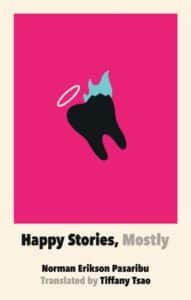GABY RUSLI WRITES— To be or not to be happy? That is certainly not the question. The soon-to-be-published in America short story collection Happy Stories, Mostly (2021) expresses an LGBTQ+ person’s limited accessibility to happiness in a world plagued with acute heteronormativity.

Happy Stories, Mostly (2023) by Indonesian-born Norman Erikson Pasaribu is a collection of twelve short stories translated from Bahasa Indonesian to English by Tiffany Tsao. Sent to us ahead of its intended publication date of June 6th by The Feminist Press, this short story collection portrays queerness as an internal state in which happiness and fulfillment feel out of reach. Tsao, an author in her own right, wrote the novel The Majesties, published in 2018. After that, she worked with author Pasaribu to translate a collection of poems titled Sergius Seeks Bacchus (2019). As the translator of Happy Stories, Mostly, Tsao’s affinity for Pasaribu’s personality, literary tone, and rhythm beautifully illuminates Pasaribu’s ingenuity as an author.

Happy Stories, Mostly engages a dialogue that differs from Pasaribu’s previous themes of religion and ethnic culture. For example, one of the short stories in the collection, “Ad maiorem dei gloriam,” chronicles the life of a retired nun named Sister Tula, who finds her life purposeless and lonely after dedicating so many years to God. Sister Tula instead finds comfort in befriending a secretly gay single father and his young son. Through this friendship, she gains a semblance of family togetherness. What is Pasaribu saying here? Perhaps God is less autocratic and more likely indifferent to worldly and societal judgments. Such a view enhances the common ground needed for human beings to love and respect one another so that, ultimately, queerness is seen as a threat to mankind only because people have been conditioned to think so by colonialist and religious influences. The overall point: there are no strong arguments against queerness if we see LGBTQ+ as humans, just like us.
The story “So What’s Your Name, Sandra?” follows a woman trying to cope with the tragic aftermath of her son’s suicide. To this end, she goes on a solo trip to Vietnam to escape her sorrows. The narrative implies that her son committed suicide after being disowned by his mother for maintaining a relationship with another man. This tale of never-ending grief about the societal condemnation of non-heteronormative relationships reveals the damage of abandoning a family member for fear of shame and ostracism. No doubt, too, it reflects Pasaribu’s Batak identity – an ethnic group descended from warriors known for their overarching traditional values. Pasaribu, it would seem, prioritizes love above virtually all else.
Pasaribu’s LGBTQ maturity and authorial voice are clearly reflected in this exquisite work. Though somber and emotionally charged, he no longer utilizes literature to demand acceptance. Instead, Happy Stories, Mostly is less a plea than a platform displaying the need for openness and peace in place of rigid judgment founded upon long-held conventions and religious values. Only by detaching from and rejecting cultural rejection can one firmly and finally understand that queerness is not really queer.

Book Reviewer Gaby Rusli, LMU ‘20, is an International Relations graduate, an (ambitiously) self-proclaimed jack of all trades, and an unapologetic cat lady. She spends her time reading books written by Asian authors as it is a source of empowerment in her identity as a woman of color.
Edited by book review editor-in-chief Ella Kelleher.

